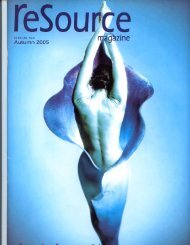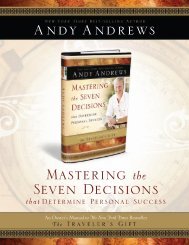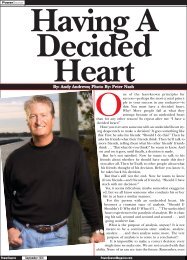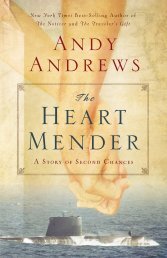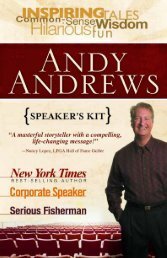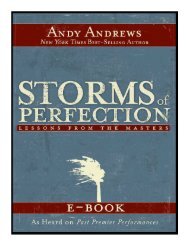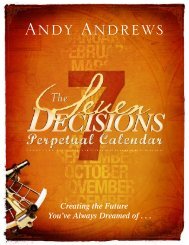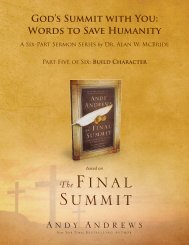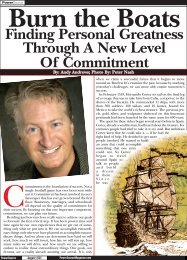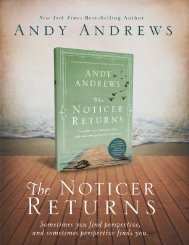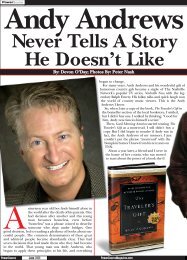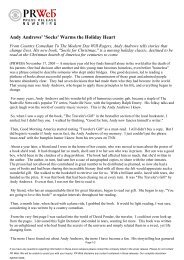Before Reading Activities - Andy Andrews
Before Reading Activities - Andy Andrews
Before Reading Activities - Andy Andrews
Create successful ePaper yourself
Turn your PDF publications into a flip-book with our unique Google optimized e-Paper software.
The<br />
Young<br />
Traveler’s<br />
Gift<br />
SEVEN DECISIONS THAT DETERMINE PERSONAL SUCCESS<br />
by <strong>Andy</strong> <strong>Andrews</strong><br />
A Curriculum Guide for Teachers<br />
Middle School — High School<br />
Including Student Reproducible Pages<br />
Written by<br />
Peggy Hoekenga, MEd<br />
Edited by<br />
Will Hoekenga, SixWordsStudio.com<br />
Layout and Design by<br />
Kevin Burr, OcularInk.com<br />
Lightning Crown Publishers, Inc.<br />
P.O. Box 17321 | Nashville, TN 37217<br />
1-800-726-2639<br />
www.<strong>Andy</strong><strong>Andrews</strong>.com<br />
© 2011 Lightning Crown Publishers, Inc.<br />
All content owned by Lightning Crown Publishers, Inc. All rights reserved.<br />
Portions of the work may be reproduced and distributed for educational purposes only.
About the Curriculum Guide Author<br />
About the Curriculum Guide Author<br />
The Young Traveler’s Gift<br />
Peggy Hoekenga is an assistant professor at the University of North Alabama, where she taught first grade at<br />
Kilby Laboratory School for seven years and is currently beginning her fifth year as the Alabama <strong>Reading</strong> Initia-<br />
tive reading coach for grades K-6. She received her Master’s Degree in Early Childhood Education from the<br />
University of Mississippi. In 2008, the Northwest Alabama <strong>Reading</strong> Council selected her as <strong>Reading</strong> Teacher of<br />
the Year. She currently lives in Florence, AL, with her husband of 34 years, Paul.<br />
<strong>Andy</strong> <strong>Andrews</strong> Page 3
Table of Contents<br />
Table of Contents<br />
The Young Traveler’s Gift<br />
Summary............................................................................................................................p. 5<br />
About the Author................................................................................................................p. 6<br />
<strong>Before</strong> <strong>Reading</strong> <strong>Activities</strong>....................................................................................................p. 7<br />
Build Background Knowledge..........................................................................................p. 7<br />
Set Purpose for <strong>Reading</strong>................................................................................................p. 8<br />
Graphic Organizers for Pre-<strong>Reading</strong> <strong>Activities</strong>................................................................p. 9-13<br />
Introduce Vocabulary...............................................................................................p. 14-23<br />
Vocabulary and Word Study <strong>Activities</strong>..........................................................................p. 17-28<br />
During <strong>Reading</strong>...................................................................................................................p. 29<br />
Questions for Discussion and Comprehension..............................................................p. 29-36<br />
After <strong>Reading</strong> <strong>Activities</strong>......................................................................................................p. 37<br />
Enrichment/Extend the Learning....................................................................................p. 37-45<br />
Vocabulary Quiz.........................................................................................................p. 45-49<br />
Book Test......................................................................................................................p. 50-54<br />
Quiz and Test Answer Keys.........................................................................................p. 55-56<br />
<strong>Andy</strong> <strong>Andrews</strong> Page 4
Summary<br />
Summary<br />
The Young Traveler’s Gift<br />
Michael Holder began his journey as the last young traveler to receive the unique gifts of wisdom offered by his-<br />
torical greats.<br />
In his senior year of high school, Michael hit rock bottom. After being caught in the wrong place at the wrong time,<br />
he was suspended from the track team and lost his college scholarship. His coach was angry and his parents dis-<br />
appointed. He was diving headfirst into a downward spiral. Facing the bleak future ahead, he saw no way out and<br />
wondered if life was really worth living. But now, with some divine intervention, he’s been given a second chance<br />
and offered a once-in-a-lifetime journey of discovery.<br />
Rewritten to engage the minds of teens and tweens, The Young Traveler’s Gift is sure to encourage and enlighten<br />
young men and women as they prepare to face the journeys that lie ahead.<br />
<strong>Andy</strong> <strong>Andrews</strong> Page 5
About the Author<br />
About the Author<br />
The Young Traveler’s Gift<br />
Hailed by a New York Times writer as “someone who has quietly become one of the most influential people in<br />
America,” ANDY ANDREWS is the author of the New York Times bestsellers The Noticer and The Traveler’s<br />
Gift, and is also an in-demand speaker for the world’s largest organizations. The Noticer and The Traveler’s Gift<br />
were featured selections of ABC’s Good Morning America, have been translated into nearly 20 languages, and<br />
continue to appear on bestseller lists around the world.<br />
<strong>Andy</strong> has spoken at the request of four different United States presidents and toured military bases around the<br />
world, being called upon by the Department of Defense to speak about the principles contained in his books. Ar-<br />
guably, there is no single person on the planet better at weaving subtle yet life-changing lessons into riveting tales<br />
of adventure and intrigue—both on paper and on stage.<br />
He lives in Orange Beach, Alabama, with his wife, Polly, and their two sons.<br />
<strong>Andy</strong> <strong>Andrews</strong> Page 6
<strong>Before</strong> <strong>Reading</strong> <strong>Activities</strong><br />
<strong>Before</strong> <strong>Reading</strong> <strong>Activities</strong><br />
Build Background Knowledge<br />
Select one of the following activities to build background knowledge:<br />
1<br />
2<br />
The Young Traveler’s Gift<br />
Have students participate in a “quick write.” They will write down the person from history whom they would<br />
most like to talk to and then they will write down as many questions to ask their famous person as possible.<br />
Students must write as quickly as they can, because they will only have two minutes in which to write.<br />
• Who would they choose to visit?<br />
• Why did they select this person?<br />
• What questions will they ask this person?<br />
• List three guidelines for successful living or “rules to live by” that they think this person<br />
would tell them.<br />
Give students a time limit (maybe 10-15 minutes) to compose their thoughts. Then, have the students<br />
meet with a partner or in a small group. Each person will give the person who is sharing feedback using<br />
the 3-2-1 graphic organizer on page 9.<br />
Ask students the following question: If you could speak to one famous person from the past, whom would<br />
you choose? Give students 1-2 minutes of think time before they can speak and share any answers<br />
aloud. Then, have students share the names of the people they would choose. Teacher will list these<br />
names on the board. Next, divide students into small groups to narrow down the list on the board. They<br />
should, as a group, pick one person they would choose and list three questions they would ask this per-<br />
son. They must also explain why they would choose this person, what they can learn from this person,<br />
and why they would ask them these particular questions.<br />
<strong>Andy</strong> <strong>Andrews</strong> Page 7
<strong>Before</strong> <strong>Reading</strong> <strong>Activities</strong><br />
Set Purpose for <strong>Reading</strong><br />
Choose one of the following to set the purpose for reading:<br />
1<br />
2<br />
3<br />
• a copy of the Gettysburg address<br />
• a diary<br />
• a Bible<br />
• a crown<br />
• a world map<br />
• a small globe<br />
The Young Traveler’s Gift<br />
Tell students that they will be reading a book about a boy who learns several valuable life lessons from<br />
famous historical figures. Ask them to make a list of each lesson as they read about them using the graphic<br />
organizer on p. 10 and 11.<br />
Fill a small suitcase with the following items:<br />
• a notecard with “The Buck Stops Here” written on it<br />
• a picture of a Union Soldier<br />
• a pink rose<br />
• a Star of David<br />
• a copy of the Presidential Seal<br />
Have students list these items on their graphic organizer. Then, as they read the story, they should<br />
figure out with whom these items are associated. Some items might be readily identified with more<br />
than one character and some characters may be identified with more than one item. As they list the<br />
items, explain why they’ve chosen the item(s) to go with each character. They may use the graphic<br />
organizer on p. 12-13, and it may be copied front and back on one sheet of paper.<br />
Show students the front of the book and read the title to them. Ask students to make predictions about<br />
the traveler’s identity and what the traveler’s gift might be. They may also predict where they think the<br />
traveler might be going and what he/she will do when they get there.<br />
<strong>Andy</strong> <strong>Andrews</strong> Page 8
<strong>Before</strong> <strong>Reading</strong> <strong>Activities</strong><br />
Graphic Organizers for <strong>Before</strong> <strong>Reading</strong> <strong>Activities</strong><br />
3 - 2 - 1<br />
The Young Traveler’s Gift<br />
List 3 things you like or thought were interesting about the person your classmate chose and the questions<br />
they would ask them:<br />
List 2 suggestions that you have for your classmate about what they said:<br />
List 1 question that you have for your classmate:<br />
<strong>Andy</strong> <strong>Andrews</strong> Page 9
<strong>Before</strong> <strong>Reading</strong> <strong>Activities</strong><br />
Graphic Organizers for <strong>Before</strong> <strong>Reading</strong> <strong>Activities</strong><br />
Seven Life Lessons Learned from Heroes of the Past<br />
The Young Traveler’s Gift<br />
Directions: Complete the Graphic Organizer as you read about each famous person that David Ponder en-<br />
countered in his travels. Include the place and time period for the meeting (i.e. 1863, Gettysburg, PA). Then,<br />
in your own words, give a brief summary of the lesson that David learned.<br />
1st Hero:<br />
Time Period and Location in History:<br />
Life Lesson Learned:<br />
2nd Hero:<br />
Time Period and Location in History:<br />
Life Lesson Learned:<br />
3rd Hero:<br />
Time Period and Location in History:<br />
Life Lesson Learned:<br />
<strong>Andy</strong> <strong>Andrews</strong> Page 10
<strong>Before</strong> <strong>Reading</strong> <strong>Activities</strong><br />
4th Hero:<br />
Time Period and Location in History:<br />
Life Lesson Learned:<br />
5th Hero:<br />
Time Period and Location in History:<br />
Life Lesson Learned:<br />
6th Hero:<br />
Time Period and Location in History:<br />
Life Lesson Learned:<br />
7th Hero:<br />
Time Period and Location in History:<br />
Life Lesson Learned:<br />
The Young Traveler’s Gift<br />
<strong>Andy</strong> <strong>Andrews</strong> Page 11
<strong>Before</strong> <strong>Reading</strong> <strong>Activities</strong><br />
What’s in the Traveler’s Suitcase?<br />
The Young Traveler’s Gift<br />
Directions: In the box below, list the items that were found in your teacher’s suitcase. As you read, list the<br />
character that the item(s) signify. Some items may be suitable for more than one character. Briefly explain<br />
why the item(s) might represent that particular character.<br />
Contents of Suitcase:<br />
1. Character:<br />
Item(s):<br />
What is the significance of the item(s) to that person?<br />
2. Character:<br />
Item(s):<br />
What is the significance of the item(s) to that person?<br />
3. Character:<br />
Item(s):<br />
What is the significance of the item(s) to that person?<br />
<strong>Andy</strong> <strong>Andrews</strong> Page 12
<strong>Before</strong> <strong>Reading</strong> <strong>Activities</strong><br />
4. Character:<br />
Item(s):<br />
What is the significance of the item(s) to that person?<br />
5. Character:<br />
Item(s):<br />
What is the significance of the item(s) to that person?<br />
6. Character:<br />
Item(s):<br />
What is the significance of the item(s) to that person?<br />
7. Character:<br />
Item(s):<br />
What is the significance of the item(s) to that person?<br />
The Young Traveler’s Gift<br />
<strong>Andy</strong> <strong>Andrews</strong> Page 13
<strong>Before</strong> <strong>Reading</strong> <strong>Activities</strong><br />
Introduce Vocabulary<br />
excruciating (p. 1)<br />
designated (p. 9)<br />
stunned (p. 37)<br />
astonishment (p. 43)<br />
terse (p. 1)<br />
delinquent (p. 11)<br />
contrasted (p. 19)<br />
apostle (p. 25)<br />
murmured (p. 40)<br />
disarray (p. 46)<br />
Chapters 1 & 2<br />
endangerment (p. 2, 16)<br />
trauma (p. 12)<br />
Chapter 3<br />
vague (p. 24)<br />
Chapter 4<br />
ample (p. 26)<br />
despair (p. 41)<br />
tolerate (p. 47)<br />
The Young Traveler’s Gift<br />
The vocabulary should be introduced prior to reading. The words are listed by chapters. Determine how<br />
many chapters you will assign to your students and then introduce the corresponding vocabulary prior to their<br />
reading. You may choose all the words in each section, or select the ones that best suit the ages, needs, and<br />
knowledge-base of your students. When choosing vocabulary words, look for high utility words that students<br />
will use frequently in their oral vocabulary and writing. While students may not know the definitions of some<br />
words, that doesn’t mean they are high utility vocabulary words.<br />
Vocabulary activities and graphic organizers are on the pages following the vocabulary lists.<br />
liability (p. 7)<br />
pending (p. 16)<br />
enunciated (p. 24)<br />
optimistic (p. 8)<br />
embankment (p. 18)<br />
fluently (p. 43)<br />
bombard (p. 50)<br />
<strong>Andy</strong> <strong>Andrews</strong> Page 14
<strong>Before</strong> <strong>Reading</strong> <strong>Activities</strong><br />
gruesome (p. 54)<br />
tactics (p. 61)<br />
muffled (p. 85)<br />
stout (p. 74)<br />
tentative (p. 82)<br />
contemplating (p. 103)<br />
hoarded (p. 122)<br />
civil (p. 55, 56)<br />
retreat (p. 62)<br />
annex (p. 88)<br />
Chapter 5<br />
Chapter 6<br />
Chapter 7<br />
meager (p. 93) unattainable (p. 98) potent (p. 99)<br />
stammer (p. 105)<br />
assurance (p. 122)<br />
convictions (p. 77)<br />
passionate (p. 82)<br />
Chapter 8<br />
prompted (p. 58)<br />
indecisive (p. 69)<br />
shrugged (p. 91)<br />
pursued (p. 107)<br />
seethed (p. 122)<br />
The Young Traveler’s Gift<br />
consensus (p. 78)<br />
procrastinate (p. 83)<br />
forfeited (p. 59)<br />
idle (p. 69)<br />
censored (p. 91)<br />
bestow (p. 122)<br />
nurture (p. 122)<br />
<strong>Andy</strong> <strong>Andrews</strong> Page 15
<strong>Before</strong> <strong>Reading</strong> <strong>Activities</strong><br />
renders (p. 130)<br />
regenerate (p. 133)<br />
arrogance (p. 139)<br />
literary (p. 146)<br />
inaudible (p. 151)<br />
Chapter 9<br />
circumstances (p. 131)<br />
calamity (p. 136)<br />
persist (p. 142)<br />
Chapters 10 & 11<br />
The Young Traveler’s Gift<br />
dispensation (p. 132)<br />
dissolution (p. 137)<br />
precursor (p. 142)<br />
concussion (p. 152) regal (p. 155)<br />
<strong>Andy</strong> <strong>Andrews</strong> Page 16
<strong>Before</strong> <strong>Reading</strong> <strong>Activities</strong><br />
Vocabulary <strong>Activities</strong><br />
1<br />
2<br />
3<br />
4<br />
5<br />
6<br />
The Young Traveler’s Gift<br />
For Grades 6-8<br />
Have students define the vocabulary words that you select using the graphic organizers on pages 19,<br />
20, 21, or 22.<br />
Assign each student one of the vocabulary words. Give them a 4 x 6 note card. They will write the word<br />
on the back of the card. Have them fold the card in fourths. Then, in each square, they will write one of<br />
the following: a definition, synonym, antonym, and an illustration for the word. Instead of antonym and<br />
synonym, you might ask them to provide some examples and non-examples. Students will then swap<br />
their cards with a partner and try to guess the word. The cards are self-checking, so they could also be<br />
collected and placed in a center.<br />
Students could make semantic maps for some of the more difficult words. In the middle of their paper,<br />
they will draw a circle and write the vocabulary word in the circle. Extend lines out from the circle and,<br />
at the end of each line, write any words that are related to the word. (Students can design their own<br />
map or organizer.)<br />
Have one student sit with his or her back to the board. The teacher will write a vocabulary word on the<br />
board, and the other students will give clues, one at a time, until the student with his or her back to the board<br />
guesses the word correctly. The clues can be: antonyms, synonyms, part of speech, definition, etc…<br />
Use the Word Sort graphic organizer on page 23 so that students can identify the parts of speech for the<br />
vocabulary words that you select. You may want to include the page numbers where the words are found<br />
if you use words from multiple chapters.<br />
Some students continue to become confused when asked to spell words with inflectional endings. If you<br />
have students who are having trouble with this skill, have them sort the vocabulary words and other words<br />
from the book with inflectional endings using the sorting activity on page 25.<br />
<strong>Andy</strong> <strong>Andrews</strong> Page 17
<strong>Before</strong> <strong>Reading</strong> <strong>Activities</strong><br />
7<br />
8<br />
9<br />
The Young Traveler’s Gift<br />
Have students write the vocabulary words that have prefixes and/or suffixes. Then, have them write the<br />
base word for each of these words. Next, they will write as many other forms of the word as possible by<br />
adding different prefixes and/or suffixes. They can use their own paper, or the grid on page 27. You may<br />
want to provide the students with a prefix and suffix word bank. If so, there is one on the page following the<br />
graphic organizer, but, unless absolutely necessary, don’t limit them to the word banks.<br />
Have students write a short story or a poem using all the vocabulary words from one or two chapters.<br />
Have students go to the following website: www.makebeliefscomix.com and select a character<br />
for each vocabulary word and a speech bubble. Then, have them write a sentence in each speech<br />
bubble using a vocabulary word. When they are finished, they must print their work, as this site will not<br />
save the students’ comics.<br />
<strong>Andy</strong> <strong>Andrews</strong> Page 18
<strong>Before</strong> <strong>Reading</strong> <strong>Activities</strong><br />
Word:<br />
Antonyms: Synonyms:<br />
Illustrate:<br />
Use in a sentence:<br />
Word:<br />
Antonyms: Synonyms:<br />
Illustrate:<br />
Use in a sentence:<br />
The Young Traveler’s Gift<br />
<strong>Andy</strong> <strong>Andrews</strong> Page 19<br />
Word:<br />
Antonyms: Synonyms:<br />
Illustrate:<br />
Use in a sentence:<br />
Word:<br />
Antonyms: Synonyms:<br />
Illustrate:<br />
Use in a sentence:
<strong>Before</strong> <strong>Reading</strong> <strong>Activities</strong><br />
Name<br />
Word:<br />
Short Definition (in your own words):<br />
1.<br />
2.<br />
Synonyms<br />
Use the word in a sentence.<br />
Vocabulary Words<br />
The Young Traveler’s Gift<br />
Antonyms<br />
Visual representation of the word. How would you illustrate this word?<br />
<strong>Andy</strong> <strong>Andrews</strong> Page 20<br />
1.<br />
2.
<strong>Before</strong> <strong>Reading</strong> <strong>Activities</strong><br />
Vocabulary Word Definitions Using context clues<br />
Word: Page # found in text:<br />
Sentence used from text:<br />
Your definition based on context clues:<br />
Word: Page # found in text:<br />
Sentence used from text:<br />
Your definition based on context clues:<br />
Word: Page # found in text:<br />
Sentence used from text:<br />
Your definition based on context clues:<br />
The Young Traveler’s Gift<br />
<strong>Andy</strong> <strong>Andrews</strong> Page 21
<strong>Before</strong> <strong>Reading</strong> <strong>Activities</strong><br />
Vocabulary Word Graphic Organizer<br />
Word: Definition:<br />
Synonym: Antonym:<br />
Source of definition:<br />
Word: Definition:<br />
Synonym: Antonym:<br />
Source of definition:<br />
Word: Definition:<br />
Synonym: Antonym:<br />
Source of definition:<br />
Word: Definition:<br />
Synonym: Antonym:<br />
Source of definition:<br />
The Young Traveler’s Gift<br />
<strong>Andy</strong> <strong>Andrews</strong> Page 22
<strong>Before</strong> <strong>Reading</strong> <strong>Activities</strong><br />
Name<br />
Vocabulary Word Sort<br />
Noun<br />
Parts of Speech<br />
The Young Traveler’s Gift<br />
**Find the words that can be used as multiple parts of speech. Then, locate the word in the text and indicate which part of speech it<br />
is used as in the book.<br />
Word<br />
Verb<br />
Adjective Adverb More than One**<br />
Page Number in Book Part of speech as used in text<br />
<strong>Andy</strong> <strong>Andrews</strong> Page 23
<strong>Before</strong> <strong>Reading</strong> <strong>Activities</strong><br />
Name<br />
Inflectional Endings Word Sort<br />
devastating<br />
awe-inspiring<br />
disheveled<br />
vilified<br />
A note to teachers and directions for use:<br />
The Young Traveler’s Gift<br />
Cut out the above words. Write the base word for each word in that first column of their blank grid (following page).<br />
Then, sort and glue them into the appropriate column on the blank grid. If you have students who are struggling<br />
readers and spellers, manipulating the words will be most helpful for them. When they finish sorting and gluing<br />
them in the correct column, you may also want to have them follow up by making their own grid and writing the<br />
words on another sheet of paper, exactly as they have them sorted. You may also want them to conduct a word<br />
search in other reading materials for words with inflectional endings, and add them where they would belong in<br />
the sort. For students who don’t need as much practice, or to conserve paper, teachers might choose to post the<br />
vocabulary words, and have students do a writing sort with the words and simply write them in the appropriate<br />
column on their sheet. Students could even make their own grid if the teacher provides them with a model.<br />
When students have completed the sorting, ask them if there are any generalizations they can make about when<br />
to drop e, make no changes, etc…This helps them form their own rules about when to make these changes and<br />
helps them remember the rules.<br />
flayed<br />
maneuvered<br />
enlightening<br />
diverted<br />
immersed<br />
pronounced<br />
honing<br />
agonized<br />
jostling<br />
enthralled<br />
transfixed<br />
<strong>Andy</strong> <strong>Andrews</strong> Page 24
<strong>Before</strong> <strong>Reading</strong> <strong>Activities</strong><br />
Inflectional Endings Word Sort<br />
The Young Traveler’s Gift<br />
Base Word e drop Change y to i No change Double<br />
<strong>Andy</strong> <strong>Andrews</strong> Page 25
<strong>Before</strong> <strong>Reading</strong> <strong>Activities</strong><br />
Vocabulary Word Sort<br />
Answer Key<br />
for Inflectional Word Endings<br />
Sort Vocabulary Word Graphic Organizer<br />
The Young Traveler’s Gift<br />
Base Word e drop Change y to i No change Double<br />
excruciate<br />
designate<br />
pending<br />
contrast<br />
enunciate<br />
stun<br />
murmur<br />
prompt<br />
reply<br />
forfeit<br />
muffle<br />
shrug<br />
censor<br />
pursue<br />
contemplate<br />
seethe<br />
hoard<br />
nod<br />
excruciating<br />
designated<br />
enunciated<br />
muffled<br />
pursued<br />
contemplating<br />
seethed<br />
replied<br />
pending<br />
contrasted<br />
murmured<br />
prompted<br />
forfeited<br />
censored<br />
hoarded<br />
stunning<br />
shrugged<br />
nodded<br />
<strong>Andy</strong> <strong>Andrews</strong> Page 26
<strong>Before</strong> <strong>Reading</strong> <strong>Activities</strong><br />
New Words:<br />
New Words:<br />
New Words:<br />
New Words:<br />
Vocabulary Word<br />
Vocabulary Word<br />
Vocabulary Word<br />
Vocabulary Word<br />
How Many Words Can You Create?<br />
The Young Traveler’s Gift<br />
Choose a vocabulary word that has a prefix and/or a suffix. Then, identify the base word in the word. How many<br />
new words can you create by adding different prefixes and/or suffixes to the base word?<br />
Base Word<br />
Base Word<br />
Base Word<br />
Base Word<br />
<strong>Andy</strong> <strong>Andrews</strong> Page 27
<strong>Before</strong> <strong>Reading</strong> <strong>Activities</strong><br />
antidisin-,immisnonprereun-<br />
-able, -ible<br />
-en<br />
-er<br />
-est<br />
-ful<br />
-ly<br />
-ment<br />
-ness<br />
-y<br />
Prefix<br />
Suffix<br />
Word Banks<br />
Common Prefixes<br />
against<br />
not, opposite<br />
in<br />
not, wrongly<br />
not<br />
before<br />
again<br />
not<br />
Common Suffixes<br />
The Young Traveler’s Gift<br />
Meaning<br />
Meaning<br />
can be done<br />
made of<br />
compare two things<br />
compare more than two things<br />
full of<br />
like (adverb)<br />
action of process<br />
condition of<br />
like (adjective)<br />
<strong>Andy</strong> <strong>Andrews</strong> Page 28
During <strong>Reading</strong> <strong>Activities</strong><br />
During <strong>Reading</strong> <strong>Activities</strong><br />
Questions for Discussion and Comprehension<br />
Chapter One<br />
The Young Traveler’s Gift<br />
1. Michael had so many questions and thoughts going through his mind as the police officer called his parents.<br />
How do you think your parents would feel if they got a phone call saying that you were in jail? What do you<br />
think they would say? How do you think they would treat you? (Answers to these questions will vary.)<br />
2. Do you think it was fair for Michael’s dad to expect Michael to get a part-time job to pay for his attorney?<br />
Why or why not? (Answers will vary.)<br />
3. Michael had not been drinking, but his friends had. He certainly couldn’t let them drive, so he became the desig-<br />
nated driver. He hadn’t done anything wrong; he was just helping out. But now, Michael was in as much trouble<br />
as his under-age drinking friends were. What should Michael have done? Is there a better choice that he could<br />
have made before getting behind the wheel of that car? What would you have done? (Answers will vary.)<br />
Chapter Two<br />
1. Michael’s friends and teachers treated him badly at school the next day. Do you think they treated him fairly?<br />
How would you have treated him? Explain your answer. (Answers will vary.)<br />
2. What did the coach tell Michael? (No practice, no playing, and that if he didn’t play, he wouldn’t have any<br />
chance for a college scholarship.) Do you think this was fair? Why? (Accept any reasonable answers.)<br />
3. The sign at the restaurant said they were hiring servers. At first, the manager seemed very eager to hire Mi-<br />
chael. Why do you think the manager suddenly became disinterested in hiring Michael? Did he have a valid<br />
reason? (Answers will vary, but should include that Michael had been arrested.)<br />
<strong>Andy</strong> <strong>Andrews</strong> Page 29
During <strong>Reading</strong> <strong>Activities</strong><br />
The Young Traveler’s Gift<br />
4. Michael left the restaurant feeling frustrated and hopeless. Why did he feel this way? What did he do next?<br />
(He knew the manager was never going to call him because he had been arrested and had a criminal record.<br />
He realized this would be asked on all the applications and no one would ever hire him. How would he pay<br />
his attorney and how would he pay for college? He was also discouraged because he had disappointed his<br />
parents. He began to cry and drive way too fast. He lost control of the car and went over an embankment.)<br />
Chapter Three<br />
1. Where is Michael when he wakes up? Describe the setting in great detail. (He is sitting on an expensive<br />
looking rug in a fancy room with high ceilings. There is a very large hand-carved desk, an un-lit fireplace,<br />
and a globe on a pedestal. It is very warm and the windows are open. He is in Potsdam, Germany, and it is<br />
Tuesday, July 24, 1945.)<br />
2. Michael thinks he might be in the hospital. Do you think he is dreaming? Do you think he is alive? Explain<br />
your answer. (Answers will vary.)<br />
3. Whom does Michael meet here? (President Harry Truman) This person tells Michael that the choices he<br />
has made will affect him for the rest of his life. Do you believe this is true? Explain your answer and give an<br />
example. (Accept any reasonable answers.)<br />
4. Michael is given a piece of paper by this person. What does he learn when he opens it and reads it? (He<br />
learns the first decision for success, the buck stops here.) In your own words, explain what this means. (An-<br />
swers will vary.)<br />
Chapter Four<br />
1. What happened when Michael read the final words on the note? (Everything around him began to change and<br />
shift. He felt dizzy. Suddenly he was in another place, as though he had fallen through the floor.) Where is he<br />
now? (He is in a very large, ornate room with a lot of other people.)<br />
<strong>Andy</strong> <strong>Andrews</strong> Page 30
During <strong>Reading</strong> <strong>Activities</strong><br />
The Young Traveler’s Gift<br />
2. What is going on? (A gong has sounded and people are falling to their knees. The gong sounds again and<br />
a very large, richly clothed man appears. He is wearing a crown and he sits upon the throne in the room. An<br />
argument begins to ensue.) Why are the two women here and what are they arguing about? (They are here<br />
to get the king to settle their dispute. They are arguing over a baby. One woman says the other woman’s baby<br />
died and then she brought it to her room and swapped the dead baby for her living baby. Then, she pretended<br />
it was her own child. The other woman says this is not true.) How does the King settle their dilemma? (He<br />
says he will cut the child in half and they can each have a part of him. One of the women falls to her knees<br />
and pleads with the king not to kill him and just give him to the other woman. The other woman hatefully says<br />
that he can go ahead and cut him in half so that neither of them has a child. The king puts his sword down and<br />
gives the child to the woman who is weeping, as he feels she is surely the mother.)<br />
3. Does Michael recognize the king? (Yes, he knows this is King Solomon.) How does he know his identity? (He<br />
remembers this Bible story from his childhood.)<br />
4. Do you think that your friends influence what you do and the decisions that you make? Why or why not? Give<br />
an example to support your thinking. (Answers will vary.)<br />
5. The king left Michael with the second decision for success. What was it? (I will seek wisdom.) In your own<br />
words, explain what it means. (Accept all reasonable answers.)<br />
Chapter Five<br />
1. At the beginning of chapter five, we learn that Michael hears the loudest noise that he has ever heard in his life.<br />
What is it? (He thinks it is thunder, but it’s actually a cannon firing.) Where is he and what is going on there?<br />
(He is in Gettysburg, PA, during the Civil War.)<br />
2. Who is Chamberlain? (Colonel Joshua Lawrence Chamberlain is an officer in the Union Army. <strong>Before</strong> this war,<br />
he was a school teacher in Maine.) Why did Chamberlain join the Army? (It was the patriotic thing to do, he<br />
was bored, he was ashamed not to join, he thought it would be over quickly and it would be fun, but mostly he<br />
joined because it was the right thing to do, it was his duty.)<br />
<strong>Andy</strong> <strong>Andrews</strong> Page 31
During <strong>Reading</strong> <strong>Activities</strong><br />
The Young Traveler’s Gift<br />
3. Chamberlain explains to Michael what his greatest advantage is in this fight. What is it? (He says he is a stubborn<br />
man and that he has the inability to stand by and do nothing.) What does he mean by this? (Answers will vary.)<br />
4. Here, we learn about the third decision—I am a person of action. After reading the note Chamberlain gave to Mi-<br />
chael, how would you describe a person of action? (Answers will vary, but should include something about being<br />
active, energetic, and the kind of person who inspires others to follow them. They are doers, leaders, consistent,<br />
and decisive. They are courageous and encouragers. They don’t quit, etc...)<br />
Chapter Six<br />
1. Why is Michael feeling nauseous again? (This time it’s more than just the time travel that has made him queasy;<br />
he is on a large boat, so he may be feeling a bit seasick.) Describe the setting where he finds himself now. (It is<br />
nighttime and there is the smell of salt water, reminding Michael of his summer trips to the ocean. He is sitting on<br />
a large pile of rope. The boat is moving across the Atlantic Ocean and it has a huge broadcloth sail. He is on the<br />
Santa Maria with Christopher Columbus in 1492.)<br />
2. Why did people think Christopher Columbus was crazy? (He believed he could establish a new trade route by sail-<br />
ing west. He believed that the world was a sphere while others thought it was flat.) Did it bother him that people<br />
thought this? Why or why not? (No, it did not bother him. He explained that you can’t worry what others think; that<br />
would mean that you valued their opinion more than you valued your own. He said you don’t need the permission<br />
of others to believe what you want to believe.)<br />
3. What does it mean to have a decided heart? (Answers will vary, but should include some of the following: Always<br />
searching for a solution, not for a way out of something. You have a vision and you are passionate about pursuing<br />
that vision. You won’t let anything get in the way as you pursue it. You don’t wait; you seize every opportunity to<br />
move forward. Your belief is so strong and you are so committed to your belief that others will want to follow you.<br />
You are not a procrastinator.)<br />
<strong>Andy</strong> <strong>Andrews</strong> Page 32
During <strong>Reading</strong> <strong>Activities</strong><br />
Chapter Seven<br />
The Young Traveler’s Gift<br />
1. Next, Michael finds himself in a small room with seven people. Why aren’t the people moving and talking?<br />
Explain what is going on at this very moment. (They are still and quiet because they are hiding. At this very<br />
moment, the home in which they are hiding is being searched by German soldiers. If they are found, they will<br />
be killed or taken to the concentration camps, and those who are hiding them will be punished.)<br />
2. Soon, a young girl takes Michael upstairs to the attic. Who is this girl, where are they, and what is the date?<br />
(Anne Frank—they are in Amsterdam in the annex behind a warehouse. It is Thursday, October 28, 1943.)<br />
3. Michael is surprised by Anne’s response when he asks her what she complains about. In your own words, ex-<br />
plain her response. (Answers will vary, but should sound something like the following: Anne says she does not<br />
complain about anything. She says complaining is an activity, just like other activities, such as jumping rope.<br />
You can choose to do that activity or choose not to do it. So, she chooses NOT to complain.) Do you agree<br />
with her view on making choices? Why? (Accept any reasonable explanation.)<br />
4. What is the fourth decision for success? (Today, I will choose to be happy.) Re-read pages 98 and 99 and<br />
then explain how it is possible to be happy even when things aren’t going well for you. (Answers will vary.)<br />
Chapter Eight<br />
1. Michael returns to a place that he’s visited in an earlier chapter, but this time the setting is very different.<br />
Where is he? (He has returned to Gettysburg, PA.) Compare and contrast the events and the setting of this<br />
place as Michael sees it now to how it was the last time he visited. (Students could create a graphic organizer,<br />
or use a Venn diagram, T-chart, or any other type of diagram to compare and contrast Gettysburg during the<br />
battle Michael witnessed earlier to the cemetery dedication that is happening now.)<br />
2. President Lincoln tells Michael that his wife did not want him to be where he is today. Why did she think her<br />
husband should stay at home? (Their son, Willie, died a few months ago and now their other son, Tad, is very<br />
ill. Mrs. Lincoln felt he should stay at home today.) Why did he choose to go anyway? (He explained it was his<br />
duty to be at Gettysburg. He also knew there wasn’t much he could do for Tad, other than pray. He explained<br />
that God would hear his prayers at Gettysburg, just as well as he could at the White House.)<br />
<strong>Andy</strong> <strong>Andrews</strong> Page 33
During <strong>Reading</strong> <strong>Activities</strong><br />
The Young Traveler’s Gift<br />
3. How did Lincoln say that people could avoid being criticized? (He said the only way to avoid criticism was to do<br />
nothing and be nothing.) Do you think this is a good idea? Explain your answer. (Answers will vary.)<br />
4. What is the most important action that President Lincoln takes on a regular basis? (Forgiveness.) Why do you<br />
think this is so important? (Answers will vary.)<br />
5. What is the sixth decision for success? (I will greet this day with a forgiving spirit.) Do you think forgiveness is<br />
something that needs to happen on a daily basis? What might be the consequences of not forgiving yourself?<br />
(Answers will vary to these last two questions.)<br />
Chapter Nine<br />
1. Michael finds himself in a very unusual place this time. Describe this place. (He’s in a building that seems to have<br />
no definite structure and aisles that seem to have no end. He is surrounded by lots and lots of photographs of chil-<br />
dren. Then, he sees thousands of coats. There are heaters, diplomas, marriage licenses, and even bicycle tires.)<br />
Where do you think he might be this time? (Answers will vary.)<br />
2. Why does Michael think he is in heaven now? (Answers may vary, but should mention that he sees an angel,<br />
Gabriel.) What is this place and why is he here? (He is in “the place that never was” in order to gain wisdom<br />
and understanding.)<br />
3. Gabriel tries to explain to Michael why people give up. What did he say? (Gabriel says that we give up be-<br />
cause we lack understanding and we lack faith. He says that we give up and slow down when things become<br />
too difficult.) Have you ever given up? Why? (Answers will vary.)<br />
4. Michael has been given a great honor, that of being the last traveler. With this honor comes a task and respon-<br />
sibilities. What must he do? (Gabriel explains that Michael has been given a gift that has the power to change<br />
civilization and that it all depends on Michael and what he does with the gift. He is to study each decision, one<br />
at a time, for 21 days. It is to be the first thing he does every morning when he awakens and then again each<br />
night before he goes to bed. He cannot skip a day. The goal is for each decision to become a part of his soul,<br />
and to be engraved upon his heart. Then, he is to share the decisions with others. Those who take these deci-<br />
sions to heart, and begin to live what they say, will rise to great power and influence others along the way.)<br />
<strong>Andy</strong> <strong>Andrews</strong> Page 34
During <strong>Reading</strong> <strong>Activities</strong><br />
The Young Traveler’s Gift<br />
5. What does it mean to persist without exception? (Answers will vary, but should include some of the language<br />
from pages 142-143, along with the student’s own interpretations.)<br />
Chapter Ten<br />
1. When Michael opens his eyes this time, he is no longer traveling in the past. He is somewhere in the future.<br />
Where is he now? (He starts out in a parking lot and recognizes it as his hometown. He heads inside a building<br />
that is labeled “Auditorium for Literary Sciences.” He thinks he is a college student.)<br />
2. Michael takes a seat in an auditorium filled with people. What does he see and hear? What is going on? (A<br />
young man is speaking to a crowd in the auditorium. He is crying and sharing how Michael Holder shared the<br />
decisions with him, and how it helped him to straighten out his life. Michael also saw that many people in the<br />
audience had a copy of a book with a picture of a much older Michael Holder on the back of it.)<br />
3. Michael suddenly runs out of the building. Why do you think he is running, where is he going, what is he going to<br />
do? (Answers will vary.)<br />
Chapter Eleven<br />
1. Where is Michael now? (In the hospital.) To whom is he talking? (His mom and a doctor.) How is his attitude<br />
different from the way it was toward the end of chapter two? (At the end of chapter two, Michael was discouraged<br />
and felt hopeless, as though he no longer had a reason to live. Now, he is encouraged, filled with hope and pos-<br />
sibilities. He has a vision and a hope for the future.)<br />
2. Why did his attitude change? (He was inspired and encouraged by the lives and words of all the people he met<br />
along his journey.)<br />
3. As Michael is searching his backpack for paper and a pen, what does he find? (The small canvas pouch that<br />
Chamberlain had given to him.) Why do you think it brought tears to his eyes? (It was proof to Michael that he<br />
hadn’t been dreaming, that he really had been on a journey. He really had traveled back in time and met all those<br />
heroes of the past.)<br />
<strong>Andy</strong> <strong>Andrews</strong> Page 35
During <strong>Reading</strong> <strong>Activities</strong><br />
The Young Traveler’s Gift<br />
4. Predict what you think will happen next. What will Michael do with his new knowledge and experience? (Ac-<br />
cept any reasonable answers.)<br />
5. Look back over each of the seven decisions for success. List them, in order, on a piece of paper. Do you think<br />
any of these could make a difference in your life? How? (Answers will vary.)<br />
6. What do you think was the author’s purpose in writing this book? Do you think <strong>Andy</strong> <strong>Andrews</strong> accomplished that<br />
purpose? (Answers will vary, but should include something along the lines that the author was trying to inform us<br />
about the seven decisions for success, and show us how they can change our perspective and even our lives.)<br />
<strong>Andy</strong> <strong>Andrews</strong> Page 36
After <strong>Reading</strong> <strong>Activities</strong><br />
After <strong>Reading</strong> <strong>Activities</strong><br />
Enrichment/Extend the Learning<br />
1<br />
2<br />
3<br />
The Young Traveler’s Gift<br />
Ask students to think of and write about another famous person from the past that they think should have<br />
been included in this story. Would they use this person to share one of the decisions for success, in-<br />
stead of the person that <strong>Andy</strong> <strong>Andrews</strong> chose? Would they introduce this person in addition to the other<br />
characters? What role would they play? Would they deliver another decision for success? Why would<br />
you choose this person and why would you introduce them in the role that you have chosen?<br />
Place students in small groups. They will choose one of the heroes from the book and write a biogra-<br />
phy to share with younger children about this person. The book should be written at the appropriate<br />
age-level as assigned by the teacher. The book should tell important information about this person, as<br />
well as teach the younger students a life lesson related to the decision that this character taught Michael<br />
in The Young Traveler’s Gift. Include important events in this person’s life. Tell about their family, their<br />
education, where they grew up, what they did to make them so famous, etc. Explain what type of person<br />
they were and what character traits they possessed (i.e. determination, perseverance, honesty, cour-<br />
age). Think of a catchy title that would appeal to young children and include illustrations. The following<br />
website is an excellent tool for creating and publishing books: http://www.tikatok.com/ The site is free to<br />
use, but teachers have to register and create a class list in order for students to use it. The books can<br />
be purchased in hardback, softcover, or digital download.<br />
You are a newspaper reporter. You have been assigned to interview Michael after he returns from his<br />
time travel. Make a list of the questions that you would you ask him. Then, after students have compiled<br />
their questions (you may want to limit the number of questions they are to ask), they will swap lists with<br />
another student. Each student will now take on the role of Michael and answer the questions as they<br />
think Michael would have answered them. You could also follow up this assignment by assigning the<br />
students the roles of reporter and Michael and conducting their interviews live for the other students, us-<br />
ing their papers as the script.<br />
<strong>Andy</strong> <strong>Andrews</strong> Page 37
After <strong>Reading</strong> <strong>Activities</strong><br />
4<br />
5<br />
6<br />
7<br />
8<br />
9<br />
10<br />
The Young Traveler’s Gift<br />
Using the graphic organizer on pages 40, 41, and 42, students will think of five adjectives that de-<br />
scribe each character. They must also explain why they have chosen each adjective.<br />
Write a summary of the book in the format of CliffsNotes. You may assign different students to work<br />
on each chapter. Then, they can all be put together for the final product.<br />
Write a book review of The Young Traveler’s Gift for your local newspaper or student newspaper and<br />
actually submit it.<br />
Have students hold a “mock trial” of Michael’s reckless endangerment charge. Assign students the<br />
roles of Michael, his friends that were in the wreck with him, dad, mom, judge, attorney for Michael, at-<br />
torney for the state, any witnesses, jury, etc.<br />
Have students choose one of the characters from the book or another famous person from history to<br />
research. If they choose someone that is not in the book, they must think of a life lesson they could<br />
learn from this person. If they choose a person from the book, they will use the same lesson that this<br />
person shared with Michael in their decision for success. Then, host an event for the school, PTO, a<br />
Parent’s Night, or another class where the students dress as their famous person and come in charac-<br />
ter to portray this person to the audience assembled. They will share about their life (in the first per-<br />
son) and their background and then teach the audience their life lesson.<br />
Write a persuasive letter to a fictitious movie producer explaining why this book should be made into a<br />
movie. In the letter, provide suggestions for actors and actresses that should play the role of some of<br />
the main characters and tell why they are the best choice for that particular role.<br />
Students should work in small groups to develop a script for one of the scenes from the book that<br />
could be used as a movie trailer. Be sure it is a scene that would spark interest in the movie. Then,<br />
students should act out their script and record it to share with the rest of the class. They should add<br />
music to their video that will complement the scene they have chosen to act out.<br />
<strong>Andy</strong> <strong>Andrews</strong> Page 38
After <strong>Reading</strong> <strong>Activities</strong><br />
11<br />
12<br />
13<br />
14<br />
The Young Traveler’s Gift<br />
Create a newspaper article about Michael’s arrest and accident, or about one of the famous charac-<br />
ters in the story from Michael’s point of view. Describe his encounter with them and the lesson he<br />
learned using the newspaper clipping generator at www.foday.com.<br />
Have each student write a letter to the author of the book, <strong>Andy</strong> <strong>Andrews</strong>, explaining the impact that<br />
this book had on them.<br />
Students could work in small groups to write a song about the book. They need to include information<br />
about the setting, theme, characters, and plot of the book in their song. They may write original lyrics us-<br />
ing a tune from another song, or they may write their own original tune.<br />
Use the Compare/Contrast Chart on page 43 to compare the two presidents from the story. Students<br />
may need to do further research on these men in order to complete the chart. They should compare<br />
educational background, family life growing up, public opinion about them as president, age when<br />
president, what they are most noted for during their presidency, time period they served, and anything<br />
else the teacher determines as important.<br />
Use Author’s Craft—Figurative Language Graphic Organizer on page 44 to locate examples in the text.<br />
<strong>Andy</strong> <strong>Andrews</strong> Page 39
After <strong>Reading</strong> <strong>Activities</strong><br />
Awesome Adjectives<br />
Michael Holder<br />
1.<br />
2.<br />
3.<br />
4.<br />
5.<br />
President Harry Truman<br />
1.<br />
2.<br />
3.<br />
4.<br />
5.<br />
King Solomon<br />
1.<br />
2.<br />
3.<br />
4.<br />
5.<br />
The Young Traveler’s Gift<br />
Use five adjectives to describe each of the characters listed below from the story. Explain why you have<br />
chosen each adjective next to it.<br />
<strong>Andy</strong> <strong>Andrews</strong> Page 40
After <strong>Reading</strong> <strong>Activities</strong><br />
Colonel Joshua Lawrence Chamberlain<br />
1.<br />
2.<br />
3.<br />
4.<br />
5.<br />
Christopher Columbus<br />
1.<br />
2.<br />
3.<br />
4.<br />
5.<br />
Anne Frank<br />
1.<br />
2.<br />
3.<br />
4.<br />
5.<br />
The Young Traveler’s Gift<br />
<strong>Andy</strong> <strong>Andrews</strong> Page 41
After <strong>Reading</strong> <strong>Activities</strong><br />
President Abraham Lincoln<br />
1.<br />
2.<br />
3.<br />
4.<br />
5.<br />
Archangel Gabriel<br />
1.<br />
2.<br />
3.<br />
4.<br />
5.<br />
The Young Traveler’s Gift<br />
<strong>Andy</strong> <strong>Andrews</strong> Page 42
After <strong>Reading</strong> <strong>Activities</strong><br />
Compare, Contrast, and Draw Conclusions<br />
Two Presidents<br />
The Young Traveler’s Gift<br />
Harr y Truman Abraham Lincoln<br />
Different Same<br />
Different<br />
Based on these comparisons, what conclusions can you draw about these two men and their popularity amongst the US<br />
citizens and their leadership of the United States? (Continue your answer on back, if necessary.)<br />
<strong>Andy</strong> <strong>Andrews</strong> Page 43
After <strong>Reading</strong> <strong>Activities</strong><br />
Author’s Craft<br />
The Young Traveler’s Gift<br />
Track the Usage of Figurative Language in the Text<br />
Locate examples of the author’s use of figurative language within the book, such as: Alliteration, Cliché,<br />
Examples<br />
Hyperbole, Idiom, Metaphor, Onomatopoeia, Personification, and Simile<br />
Type of Figurative<br />
Language<br />
Page Number Where<br />
Found in Book<br />
<strong>Andy</strong> <strong>Andrews</strong> Page 44
After <strong>Reading</strong> <strong>Activities</strong><br />
Vocabulary Quiz Circle the best answer.<br />
1<br />
2<br />
3<br />
4<br />
If something is extremely painful or agonizing, we might say it is<br />
a.) enunciated<br />
b.) contemplating<br />
c.) excruciating<br />
d.) pending<br />
Which of the following is a synonym for contrasted?<br />
a.) stunned<br />
b.) prompted<br />
c.) differentiated<br />
d.) censored<br />
The Young Traveler’s Gift<br />
He gave a gruesome description of the battlefield. Which word best describes gruesome as it is used<br />
in this sentence?<br />
a.) horrific<br />
b.) detailed<br />
c.) meaningful<br />
d.) vivid<br />
A synonym for convictions is:<br />
a.) prosperity<br />
b.) disastrous<br />
c.) hardship<br />
d.) distress<br />
<strong>Andy</strong> <strong>Andrews</strong> Page 45
After <strong>Reading</strong> <strong>Activities</strong><br />
5<br />
6<br />
7<br />
8<br />
9<br />
Not clear, indefinite<br />
a.) meager<br />
b.) vague<br />
c.) liability<br />
d.) inaudible<br />
Michael was the designated driver that evening. What does designated mean?<br />
a.) late<br />
b.) sober<br />
c.) licensed<br />
d.) selected<br />
What is the suffix in dissolution?<br />
a.) dis<br />
b.) tion<br />
c.) solu<br />
d.) diss<br />
Regenerate means:<br />
a.) to restore<br />
b.) to remodel<br />
c.) to resign<br />
d.) to reassure<br />
The best antonym for ample is:<br />
a.) loud<br />
b.) generous<br />
c.) meager<br />
d.) sufficient<br />
The Young Traveler’s Gift<br />
<strong>Andy</strong> <strong>Andrews</strong> Page 46
After <strong>Reading</strong> <strong>Activities</strong><br />
10<br />
11<br />
12<br />
13<br />
14<br />
What does the prefix in- mean in the word indecisive?<br />
a.) less<br />
b.) more<br />
c.) very<br />
d.) not<br />
The Young Traveler’s Gift<br />
Read the following sentence from the book. “The rest of his clothes, except for a stout canvas jacket,<br />
were in tatters.” What is the best definition for stout as it is used in that sentence?<br />
a.) heavily built<br />
b.) bold, brave<br />
c.) sturdy<br />
d.) stubborn<br />
The general consensus was to eat dinner at 5:00. What part of speech is consensus in that sentence?<br />
a.) verb<br />
b.) noun<br />
c.) adjective<br />
d.) adverb<br />
The prefix pre- in precursor means:<br />
a.) again<br />
b.) before<br />
c.) first<br />
d.) opposite<br />
Michael will persist without exception. What does persist mean in this sentence?<br />
a.) continue<br />
b.) purchase<br />
c.) annoy<br />
d.) support<br />
<strong>Andy</strong> <strong>Andrews</strong> Page 47
After <strong>Reading</strong> <strong>Activities</strong><br />
15<br />
16<br />
17<br />
18<br />
19<br />
Noisy is to quiet as:<br />
a.) arrogance is to haughtiness<br />
b.) arrogance is to offensive<br />
c.) arrogance is to superior<br />
d.) arrogance is to humility<br />
To delay<br />
a.) retreat<br />
b.) despair<br />
c.) procrastinate<br />
d.) renders<br />
Unattainable means:<br />
a.) to remain<br />
b.) having trouble<br />
c.) not able to achieve<br />
d.) able to apply<br />
The prefix re- in the word regenerate means:<br />
a.) again<br />
b.) before<br />
c.) with<br />
d.) more<br />
The Young Traveler’s Gift<br />
Which word best completes this sentence? His mom quickly gave a ______________ explanation so<br />
they could exit immediately.<br />
a.) terse<br />
b.) regal<br />
c.) annex<br />
d.) literary<br />
<strong>Andy</strong> <strong>Andrews</strong> Page 48
After <strong>Reading</strong> <strong>Activities</strong><br />
20<br />
21<br />
22<br />
23<br />
24<br />
25<br />
Which word is an antonym for hoarded?<br />
a.) accumulated<br />
b.) spent<br />
c.) deposited<br />
d.) praised<br />
Agitated or excited<br />
a.) shrugged<br />
b.) forfeited<br />
c.) pursued<br />
d.) seethed<br />
Which word doesn’t belong?<br />
a.) differentiated<br />
b.) contrasted<br />
c.) copied<br />
d.) discriminated<br />
Great misfortune or disaster<br />
a.) calamity c.) bombard<br />
b.) circumstances d.) idle<br />
Which of the following is a person?<br />
a.) ample c.) idle<br />
b.) apostle d.) regal<br />
Which word does not belong?<br />
a.) nurture c.) tentative<br />
b.) encourage d.) training<br />
The Young Traveler’s Gift<br />
<strong>Andy</strong> <strong>Andrews</strong> Page 49
After <strong>Reading</strong> <strong>Activities</strong><br />
The Young Traveler’s Gift Test Circle the best answer.<br />
1<br />
2<br />
3<br />
4<br />
5<br />
Why did Michael feel like a failure?<br />
a.) He had disappointed his parents<br />
b.) He had let his friends down<br />
c.) He had disappointed himself<br />
d.) All of the above<br />
Why did Michael’s dad choose to tell Michael that he had cancer now?<br />
a.) He wanted to make Michael feel even guiltier about his actions<br />
b.) His mom and dad needed Michael’s help<br />
c.) He wanted Michael to feel sad<br />
d.) He wanted Michael to feel sorry for his parents<br />
Michael is going to have a difficult time finding a job. Why?<br />
a.) He doesn’t have any specialized skills<br />
b.) He is only able to work part-time<br />
c.) He has been arrested and charged with reckless endangerment<br />
d.) He is rude during his interviews<br />
The Young Traveler’s Gift<br />
For a second time, Michael wrecks the car he is driving. Where is he when he wakes up?<br />
a.) Potsdam, Germany c.) Frankfurt, Germany<br />
b.) Munich, Germany d.) Amsterdam<br />
Based on his conversation with Michael, how did President Truman feel about deploying the atomic bomb?<br />
a.) He hated it and was scared of it<br />
b.) He was excited about using it<br />
c.) He was certain it was the right thing to do<br />
d.) He was worried about what the history books would say<br />
<strong>Andy</strong> <strong>Andrews</strong> Page 50
After <strong>Reading</strong> <strong>Activities</strong><br />
6<br />
7<br />
8<br />
9<br />
10<br />
Which of the following is not true when explaining what “the buck stops here” means?<br />
a.) I must accept responsibility for my past<br />
b.) I will think constructive thoughts<br />
c.) I will blame others for my mistakes<br />
d.) I control my thoughts and emotions<br />
The Young Traveler’s Gift<br />
When Michael meets King Solomon, he discovers that he has been given a special gift during his<br />
travels. What is it?<br />
a.) The ability to tell amazing stories<br />
b.) The ability to read people’s minds<br />
c.) The ability to see through walls<br />
d.) The ability to speak and understand many languages<br />
What advice does King Solomon give to Michael?<br />
a.) To stay calm<br />
b.) To seek wisdom<br />
c.) To listen to his father<br />
d.) To read his Bible<br />
Which of the following is not true about Joshua Chamberlain?<br />
a.) He was a schoolteacher from Maine<br />
b.) He was a stubborn man<br />
c.) He was a colonel in the Confederate Army<br />
d.) He had no real knowledge of warfare<br />
After reading about Joshua Chamberlain and the actions he took on the battlefield, one can best<br />
describe him as:<br />
a.) persistent c.) tolerant<br />
b.) angry d.) foolish<br />
<strong>Andy</strong> <strong>Andrews</strong> Page 51
After <strong>Reading</strong> <strong>Activities</strong><br />
11<br />
12<br />
13<br />
14<br />
15<br />
Where does Michael meet Christopher Columbus?<br />
a.) on a ship in the Pacific Ocean<br />
b.) on a ship in the Indian Ocean<br />
c.) on a ship in the Arctic Ocean<br />
d.) on a ship in the Atlantic Ocean<br />
Which of the following is not true of a person who has a decided heart?<br />
a.) They are committed<br />
b.) They wait until conditions are exactly right<br />
c.) They are passionate about their vision for the future<br />
d.) They are dreamers<br />
Which words best describe Anne Frank?<br />
a.) angry and afraid<br />
b.) smart and talented<br />
c.) frustrated and worried<br />
d.) optimistic and grateful<br />
The Young Traveler’s Gift<br />
Anne shares the fifth decision with Michael—I will choose to be happy. What does he learn about happiness?<br />
a.) He should laugh often, every day<br />
b.) He should smile at everyone<br />
c.) A smile is a potent weapon<br />
d.) Both a and b<br />
e.) a, b, and c<br />
What most surprised Michael about President Lincoln?<br />
a.) He looked different from the pictures he’d seen in history books<br />
b.) He seemed over-sized<br />
c.) He had a high-pitched voice<br />
d.) His face appeared too long<br />
<strong>Andy</strong> <strong>Andrews</strong> Page 52
After <strong>Reading</strong> <strong>Activities</strong><br />
16<br />
17<br />
18<br />
19<br />
20<br />
Why did President Lincoln make this trip to Gettysburg?<br />
a.) To dedicate a cemetery<br />
b.) To visit sick and wounded soldiers<br />
c.) To survey the war damage<br />
d.) To meet with General Grant<br />
The Young Traveler’s Gift<br />
President Lincoln told Michael that forgiveness was the key to everything his future held and that he still<br />
had one person that he must forgive. Whom did Michael need to forgive?<br />
a.) His friend c.) His mom<br />
b.) Himself d.) His dad<br />
What was the setting for Michael’s visit with the archangel Gabriel?<br />
a.) The land of lost dreams<br />
b.) Never Never Land<br />
c.) The land that time forgot<br />
d.) The place that never was<br />
The seventh decision given to Michael was to persist without exception. Which of the following best<br />
describes a person who persists without exception?<br />
a.) They keep trying until they become exhausted<br />
b.) They are a person of great faith<br />
c.) They are an average person<br />
d.) Their focus is on the here and now<br />
At the end, when Michael is rummaging through his backpack, what proof does he find that his time<br />
travel really did happen?<br />
a.) A feather<br />
b.) A bullet from Gettysburg<br />
c.) A small, blue, canvas pouch<br />
d.) A travel log<br />
<strong>Andy</strong> <strong>Andrews</strong> Page 53
After <strong>Reading</strong> <strong>Activities</strong><br />
Answer the following questions on the back of this page.<br />
21<br />
22<br />
23<br />
The Young Traveler’s Gift<br />
Michael was given a gift to share with others. What was this gift? What do you think he will do with this<br />
gift? Why do you think this?<br />
Michael met seven different people in his time travel. If you could meet with one of these people, who<br />
would you choose? Why?<br />
Think about the Seven Decisions. Which one do you think is the most important? Why?<br />
<strong>Andy</strong> <strong>Andrews</strong> Page 54
After <strong>Reading</strong> <strong>Activities</strong><br />
Answer Keys<br />
Vocabulary Quiz<br />
1. c) excruciating<br />
2. c) differentiated<br />
3. a) horrific<br />
4. d) beliefs<br />
5. b) vague<br />
6. d) selected<br />
7. b) tion<br />
8. a) restore<br />
9. c) meager<br />
10. d) not<br />
11. c) sturdy<br />
12. b) noun<br />
13. b) before<br />
Book Test<br />
1. d) all of the above<br />
14. a) continue<br />
15. d) humility<br />
16. c) procrastinate<br />
17. c) not able to achieve<br />
18. a) again<br />
19. a) terse<br />
20. b) spent<br />
21. d) seethed<br />
22. c) copied<br />
23. a) calamity<br />
24. b) apostle<br />
25. c) tentative<br />
2. b) His mom and dad needed Michael’s help<br />
3. c) He has been arrested and charged with reckless endangerment<br />
4. a) Potsdam, Germany<br />
5. a) He hated it and was scared of it<br />
6. c) I will blame others for my mistakes<br />
7. d) The ability to speak and understand many languages<br />
8. b) To seek wisdom<br />
9. c) He was colonel in the Confederate Army<br />
10. a) persistent<br />
The Young Traveler’s Gift<br />
<strong>Andy</strong> <strong>Andrews</strong> Page 55
After <strong>Reading</strong> <strong>Activities</strong><br />
Answer Keys<br />
Book Test Continued<br />
11. d) on a ship in the Atlantic Ocean<br />
12. b) they wait until conditions are exactly right<br />
13. d) optimistic and grateful<br />
14. e) a, b, and c<br />
15. c) He had a high-pitched voice<br />
16. a) To dedicate a cemetery<br />
17. b) himself<br />
18. d) The place that never was<br />
19. b) They are a person of great faith<br />
20. c) a small, blue, canvas pouch<br />
21. The gift that Michael received was the Seven Decisions.<br />
The rest of the answers will vary. Accept any reasonable answers.<br />
22. c) Answers will vary<br />
23. c) Answers will vary<br />
The Young Traveler’s Gift<br />
<strong>Andy</strong> <strong>Andrews</strong> Page 56



